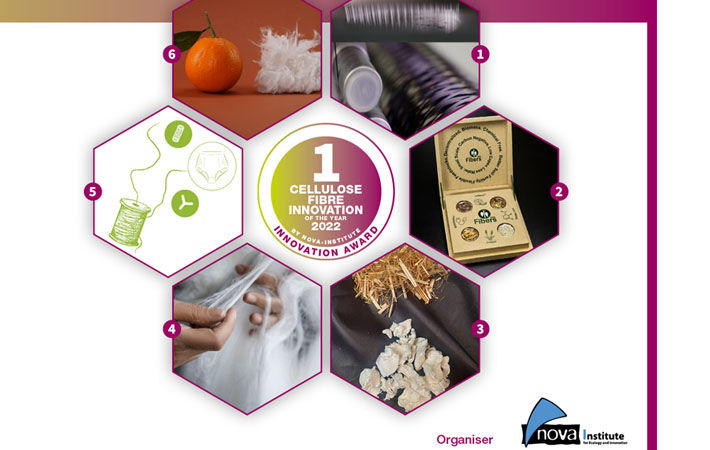
For the second time, nova-Institute will grant the 'Cellulose Fibre Innovation of the Year' within the framework of the conference to be held on February 2-3, 2022. The advisory board of the conference nominated six interesting products, ranging from cellulose made of orange- and wood pulp to a novel technology for cellulose fibre production. The presentations, election of the winner by the conference audience and the award ceremony will take place on the first day of the conference, nova-Institute said in a press release.
Cellulose fibres show an increasingly expanding wide range of applications, while at the same time markets are driven by technological developments and political framework conditions, especially bans and restrictions on plastics and increasing sustainability requirements. The conference provides rich information on opportunities for cellulose fibres through policy assessment, a session on sustainability, recycling and alternative feedstocks as well as latest development in pulp, cellulose fibres and yarns. This includes application such as non-wovens, packaging and composites.
The HighPerCellCarbon technology is a sustainable and alternative process for the production of carbon fibres made from wood. The technology starts with wet spinning of cellulosic fibres using ionic liquids (IL) as direct solvent in an environmentally friendly, closed loop filament spinning process (HighPerCell technology).
Fibers365 are the first carbon-negative virgin straw fibres on the market. The Fibers365 concept is based on a unique, state of the art process to provide functional, carbon negative, and competitive non-wood biomass products such as virgin fibres for paper, packaging and textile purposes as well as high value process energy, biopolymer and fertiliser side streams.
Iroony is a branded cellulose made by RBX Créations from hemp. This resistant hemp plant grows quickly within in a few months, massively captures carbon and displays a high content of cellulose. The biomass is directly collected from French farmers who cultivate without chemicals or irrigation, in extended rotation cycles, contributing to soil regeneration and biodiversity.
Spinnova’s innovative technology enables production of sustainable textile fibres in a mechanical process, without dissolving or any harmful chemicals. The process involves use of paper-grade pulp and mechanical refining to turn pulp into microfibrillated cellulose (MFC).
Kelheim’s plant-based and biodegradable fibres contribute significantly to a sustainable future in the field of reusable hygiene textiles. Through innovative functionalisation they are specifically adjusted to the requirements of the single layers and thereby reach a performance comparable to that of synthetic fibres.
Orange Fiber is the world's first company to produce a sustainable textile fibre from a patented process for the extraction of cellulose to be spun from citrus juice leftovers, which are more than 1 million tonnes a year just in Italy.
Fibre2Fashion News Desk (RR)

